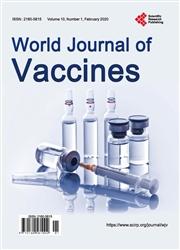Profile of Maternally Derived Antibody in Broiler Chicks and In-Ovo Vaccination of Chick Embryo against Newcastle Disease
引用次数: 7
Abstract
In this study, we determined the suitability of lentogenic LaSota and naturally occurring avirulent I2 vaccine strains of Newcastle disease (ND) virus for efficacious in-ovo vaccination of broiler chickens. A total of 114 embyonated eggs divided into five groups (A, B, C, D and E) consisting of 25 eggs in each of groups A and B, 20 eggs in each of groups C and D and 24 eggs in group E were used in the study. Eighteen-day-old embryonated eggs in group A were vaccinated in-ovo with ND-I2 vaccine while the same age of embryos in group B were vaccinated with ND-LaSota. Thirteen-day-old embryonated eggs in groups C and D were vaccinated with ND-I2 and ND-LaSota respectively. Group E served as unvaccinated control. There was significant difference (p 2) used for the in-ovo vaccination were pathogenic for chick embryos, however, ND-I2 vaccine was better tolerated when administered to 18-day-old chick embryo.肉仔鸡母源性抗体谱及鸡胚抗新城疫的蛋内接种
在本研究中,我们确定了新城疫(ND)病毒lisoa和自然产生的无毒I2疫苗株在肉鸡蛋内有效接种的适用性。试验共取胚胎卵114枚,分为A、B、C、D、E 5组,A、B组各25枚,C、D组各20枚,E组24枚。A组18日龄胚卵接种ND-I2疫苗,B组18日龄胚卵接种ND-LaSota疫苗。C组和D组13日龄胚卵分别接种ND-I2和ND-LaSota。E组作为未接种疫苗的对照组。两种疫苗对鸡胚的致病性差异有统计学意义(p < 2),但对18日龄鸡胚的耐受性较好。
本文章由计算机程序翻译,如有差异,请以英文原文为准。
求助全文
约1分钟内获得全文
求助全文

 求助内容:
求助内容: 应助结果提醒方式:
应助结果提醒方式:


